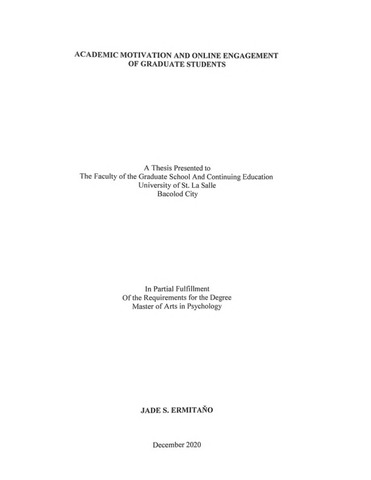Academic motivation and online engagement of graduate students
| dc.contributor.adviser | Banes, Rowena | |
| dc.contributor.author | Ermitaño, Jade S. | |
| dc.date.accessioned | 2021-11-12T00:40:55Z | |
| dc.date.available | 2021-11-12T00:40:55Z | |
| dc.date.issued | 2020 | |
| dc.identifier.citation | Ermitaño, J. S. (2020). Academic motivation and online engagement of graduate students (Unpublished Master’s thesis). University of St. La Salle, Bacolod City. | en_US |
| dc.identifier.uri | https://hdl.handle.net/20.500.12852/1677 | |
| dc.description | Abstract only | en_US |
| dc.description.abstract | Various studies have been conducted on motivation and engagement separately among students, however, only few studies talk about the Academic Motivation of graduate students and the use of engagement as a dependent variable. Studies conducted also were usually on participants who were on the normal school setting. This study looked into the Academic Motivation and Online Student Engagement of 133 graduate student participants using the ERG Theory to see if this would yield to similar or different results. Using the Descriptive Correlational Research Design, the study revealed that graduate students are highly Academically Motivated (x̄ =5.092) in terms of Professional Growth, Better Job Opportunities, Self-fulfillment, Achieving Future Goals and Plans and for Other People. However, there were no measurable difference between age (p >0.511), sex (p> 0.739), residence (p >0.067), post-graduate degree (p > 0.890) and occupation (p > 0.560) towards Academic Motivation. Participants were also highly Engaged Online (x̄=3.6529) for they seek Intellectual Advancement, Interpersonal Engagement, Personal Commitment to Studies and Career/Job Opportunities. There was a significant difference when grouped according to sex (p <0.032), age (p <0.042), and occupation(p <0.01) where males were significantly higher compared to females. Multiple comparison between variables results highlighted that there are significant differences existing between below 26 years old and 26 to 35 years old (p < 0.014), between unemployed and educational instruction (p< 0.00), between unemployed and health care support (p<0.09), between unemployed and management occupation (p<0.017), between educational instruction and management occupation (p<0.018), and between educational instruction and others (p<0.026). No significant differences were found on residence (p> 0.322) and post graduate degree (p > 0.362). The study yielded significant relationship between Academic Motivation and Online Student Engagement (p<0.003). Graduate students find Time Management as the greatest struggle followed by Personal Problems, Work-School-Life Balance, Online Class, Work and School thus a Proposed Psychosocial Program for Graduate Students: Kaya, Kinakaya at Kakayanin! was recommended by the researcher. | en_US |
| dc.format.extent | ix, 105 leaves | en_US |
| dc.language.iso | en | en_US |
| dc.subject.ddc | GSL Theses 371.4072 Er58 | en_US |
| dc.subject.lcsh | Graduate students | en_US |
| dc.subject.lcsh | Motivation in education | en_US |
| dc.subject.lcsh | Motivation (Psychology) | en_US |
| dc.subject.lcsh | Computer-assisted instruction | en_US |
| dc.subject.lcsh | Distance education | en_US |
| dc.title | Academic motivation and online engagement of graduate students | en_US |
| dc.type | Thesis | en_US |
| dcterms.accessRights | Limited public access | en |
| dc.description.bibliographicalreferences | Includes bibliographical references | en_US |
| dc.contributor.chair | Lachica, Ramon Clemente Martin F. | |
| dc.contributor.committeemember | Capay, Abigaile Rose Mary R. | |
| dc.contributor.committeemember | Alon, RM April T. | |
| dc.contributor.committeemember | Sotomil, Madeline P. | |
| dc.contributor.department | Graduate School and Continuing Education | en_US |
| dc.description.degree | Master of Arts in Psychology | en_US |
Fichier(s) constituant ce document
Ce document figure dans la(les) collection(s) suivante(s)
-
Theses [18]


